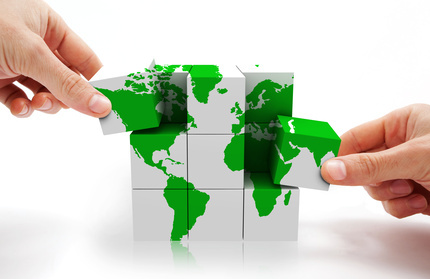De-globalisation
May 4, 2017 | Expert Insights

De-globalisation is considered the process of reducing interdependence and integration between certain parts around the world, particularly nation-state. It is largely used to describe that period in history where major economic trade and investment between countries witnessed a decline. Deglobalisation is in contrast to globalisation, wherein units become increasingly dependent on other countries and become integrated over time.
Geojit Financial Services, Managing Director, CJ George, highlighted that one of the major concerns for the Indian Market is the ongoing deglobaisation trend all over the world. It originated not only from US, uncertainties from the French elections, Brexit and so on would be major concerns for the Indian Market.
Wave of De-globalization
Brexit is one of the biggest geopolitical risks of 2016 which became a reality on June 23. The referendum had attracted the attention of the whole world, as the outcome not only looks into impacting the future of UK but also bring about huge changes in the future of globalization. From a strategic perspective, Brexit may be the first wave of anti-globalization for most popular nations.
Brexit can thereby be seen as a definite indication that Deglobalization in the next big thing in the global economy. Anti-globalization sentiments has also boomed to America but Trump’s presidency has stroked debates on the trade policies of the US. Apart from Brexit and Trumps policies, several other independent events like the fiscal crisis in the Eurozone, crash in the oil prices and the Doha negotiations are raising anti-globalization sentiments across most nation, particularly, India.
A positive impact
‘De-globalization’ Is a Way to Reduce Inequality. The race of globalisation is leaving a majority for the population far behind. It causes inequality for primarily because it weakens the bargaining position for immobile labour in comparison to fully mobile capital which drives down wages. So if globalization drives inequality, what is the remedy? Deglobalization is not a synonym for withdrawing from the world economy. It is simply the process of restructuring the world economy and building the political system so that it can be used to build the local and national economies instead of degrading it. Deglobalization may in many ways encourage the poor countries to increase the size of their domestic manufacturing industries which would help shit the relative wage structure in a way that would help increase the overall equality. With globalization, there is an increased dependency with other countries that would slower growth, lower average income and hence increase the overall poverty.
Assessment
The whole approach of De-globalization is still getting structured. It requires to be debated and combined with other ideas if viable alternatives were to be built to the flawed system that is present. It would have to be harvested and learnt from different experiences and initiatives that it has been inspired from. India would have to strike a balance between the integration into the world and preservation of their internal policies. The aim is mainly to move beyond the economics of narrow efficiency to a sphere of more democratic decision making. Thus, it is more likely to be a process marked by severe conflict.
The emergence of such a system would greatly depend on reducing the power of the western corporations that are particularly the main driver of globalization and the political and military hegemony. This system cannot come about without a change in the current global political and military system. It certainly holds more promise than the empty claims of “inclusive growth.”








Comments